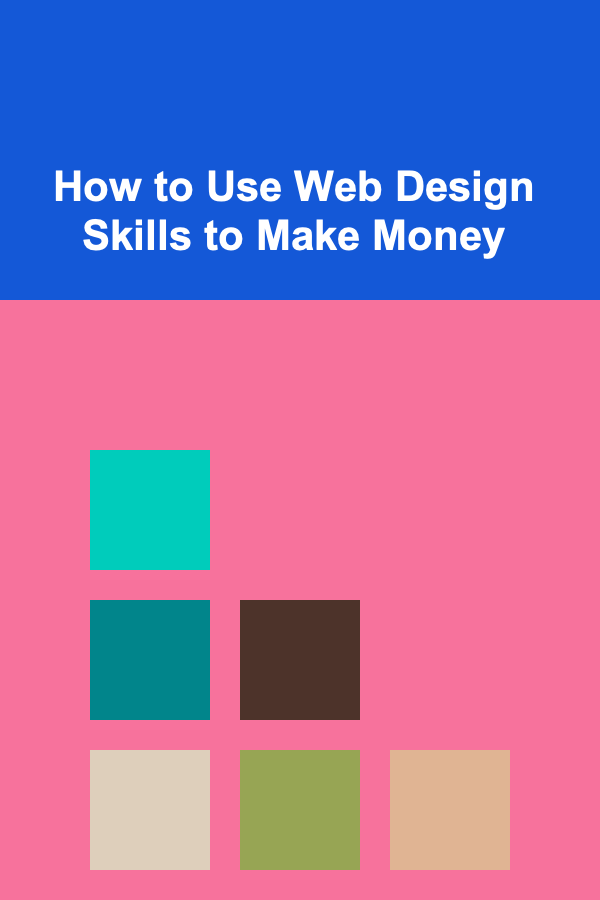
How to Use Web Design Skills to Make Money
ebook include PDF & Audio bundle (Micro Guide)
$12.99$11.99
Limited Time Offer! Order within the next:

Web design is no longer just a creative outlet; it's become a highly sought-after skill that can translate directly into a profitable career. In today's digital-first world, businesses, organizations, and individuals rely heavily on having an online presence, and a website is often the first impression customers will have. Whether you're interested in freelancing, working for a design agency, or building your own web design business, there are numerous ways to make money using your web design skills. This article explores how you can leverage web design to earn a living, providing insights into building your career and monetizing your skill set effectively.
The Importance of Web Design in Today's Digital Landscape
Before delving into the ways you can monetize your web design skills, it's essential to understand why web design is in such high demand. A well-designed website is critical to any successful business strategy. It's not just about aesthetics---it's about functionality, user experience (UX), and usability, all of which contribute to building trust and converting visitors into customers.
With the shift towards online commerce, education, entertainment, and social interaction, businesses have realized that their website is their digital storefront. Whether a small blog or a large corporate site, businesses need web designers to make their websites engaging, user-friendly, and optimized for performance. For this reason, web design has become an essential skill that has real market value.
Building a Solid Foundation as a Web Designer
Before you start monetizing your web design skills, you need to build a strong foundation. Whether you're just starting out or looking to enhance your skills, here are some critical steps to consider:
1. Learn the Basics and Master Web Design Tools
The first step to becoming a successful web designer is mastering the fundamental skills and tools. Some of the essential skills for web designers include:
- HTML/CSS: These are the building blocks of web design. HTML (HyperText Markup Language) creates the structure of a web page, while CSS (Cascading Style Sheets) controls its layout and design.
- JavaScript: While not always required for basic design work, JavaScript can enhance interactivity and dynamic functionality on websites.
- Design Software: Familiarize yourself with design software such as Adobe Photoshop, Illustrator, Figma, and Sketch. These tools are essential for creating mockups, wireframes, and prototypes.
- Responsive Design: With the variety of devices used to browse the web today, understanding responsive web design---designing websites that work on desktops, tablets, and smartphones---is crucial.
- User Experience (UX) Design: This focuses on how users interact with a website and ensures that the site is user-friendly, intuitive, and functional.
Mastering these core skills will lay the foundation for your web design career, whether you're designing from scratch or using content management systems (CMS) like WordPress, Wix, or Squarespace.
2. Build a Portfolio
A strong portfolio is critical for attracting clients and employers. It's your way of showcasing your skills and demonstrating your ability to deliver high-quality web design. Start by creating your own website to display your work. Include:
- Case studies: Show detailed examples of past projects, explaining the challenges, process, and solutions you provided.
- Mockups and wireframes: Share design concepts to demonstrate your thought process and design capabilities.
- Client testimonials: If you've worked with clients before, include their feedback to build trust with potential clients.
- Blog: Consider writing about web design trends, tips, and tutorials to showcase your expertise and improve your website's SEO.
Your portfolio should reflect your style, skills, and the quality of work potential clients can expect from you. It's often the first thing a potential client will look at, so make it count.
3. Learn the Latest Trends and Technologies
The web design industry is constantly evolving, with new technologies and trends emerging regularly. Stay updated on the latest advancements in web design by:
- Attending web design conferences and webinars
- Following blogs and forums
- Experimenting with new design tools
- Learning about SEO, accessibility, and performance optimization
This will not only help you remain competitive in the job market but also ensure that your designs are modern, user-friendly, and aligned with industry standards.
Monetizing Web Design Skills
Now that you have a solid foundation, it's time to explore the various ways you can turn your web design skills into a profitable venture. Here are several avenues for making money as a web designer:
1. Freelancing
Freelancing is one of the most popular and flexible ways to make money as a web designer. As a freelancer, you can work with a variety of clients and industries, from small businesses to large corporations. The key to success in freelancing is finding clients, delivering high-quality work, and building long-term relationships.
- How to Get Started: Create a profile on platforms like Upwork, Freelancer, or Fiverr. These platforms connect freelancers with clients looking for web design services. Start by offering competitive prices, and as you build your reputation, you can increase your rates.
- Finding Clients: You can also reach out to potential clients directly by cold emailing businesses, offering web design services. Networking with other professionals in related fields (e.g., marketing, development, or branding) can also lead to opportunities.
- Setting Your Rates: When setting your rates, consider the complexity of the project, your skill level, and the time required. For example, simple landing pages may be priced lower than a fully customized, large-scale website.
Freelancing offers the freedom to work on a variety of projects and set your own schedule, making it an attractive option for many web designers.
2. Designing Websites for Agencies
If you prefer a more structured work environment, working for a web design agency may be a good fit. Agencies typically handle larger projects, and you'll have the opportunity to work with a team of designers and developers. In these roles, you'll often work on client projects, collaborating with project managers, copywriters, and developers.
- How to Get Started: To find agency jobs, look for job listings on platforms like LinkedIn, Indeed, or Glassdoor. Many agencies also hire freelancers or offer part-time positions, so it's worth networking within the industry.
- Benefits of Agency Work: Working for an agency can offer a steady paycheck, benefits, and more extensive project management experience. You'll also get exposure to a wide range of projects and clients, which can help you grow your skill set.
Many designers also use agency work as a stepping stone to later start their own freelance or design business.
3. Creating and Selling Web Templates
If you enjoy designing websites but prefer working on your own schedule, creating and selling web templates is a great option. Many businesses and individuals need websites but don't want to invest in custom designs. They often turn to templates as a cost-effective solution.
- How to Get Started: Create high-quality website templates and sell them on platforms like ThemeForest, TemplateMonster, or Creative Market. Focus on niches or industries that are in high demand (e.g., eCommerce, portfolios, blogs).
- Marketing Your Templates: To boost sales, market your templates through social media, paid ads, or SEO. Offering free demos or discounted prices for early adopters can help generate interest.
- Benefits of Template Sales: Selling templates is a form of passive income. After creating the templates, you can continue to earn money as customers purchase them over time.
Additionally, selling templates allows you to reach a broader audience than one-on-one client work.
4. Building Your Own Web Design Business
If you're looking to scale your web design efforts and maximize your earnings, starting your own web design business may be the right path for you. This involves not only designing websites but also managing a team of designers and developers and handling business operations such as marketing, client acquisition, and project management.
- How to Get Started: Start by creating a solid business plan. Define your target market, pricing structure, and services. Build a strong brand identity and a professional website to showcase your work.
- Finding Clients: To build a client base, you'll need to network, create marketing campaigns, and offer excellent customer service. Building a good reputation through referrals and testimonials is vital for growth.
- Managing Your Business: As a business owner, you'll need to manage finances, contracts, and timelines, which may require learning about business management and entrepreneurship.
Running your own business gives you control over your time, client selection, and earnings. However, it also comes with the responsibility of managing your own workload and growing your client base.
5. Teaching Web Design
If you have a deep understanding of web design and enjoy teaching others, offering web design courses or tutorials can be a great way to monetize your skills. Many people are interested in learning web design, and the demand for online learning continues to grow.
- How to Get Started: You can teach web design through platforms like Udemy, Skillshare, or Teachable. Alternatively, you could create your own website and offer personalized coaching or workshops.
- Monetizing Your Knowledge: Besides selling courses, you can monetize your content through affiliate marketing, sponsored posts, or ad revenue if you're using platforms like YouTube or Medium to share your tutorials.
Teaching allows you to share your expertise with a global audience and earn money while helping others improve their skills.
6. Affiliate Marketing for Web Design Tools
Many web designers rely on certain tools for their workflow, and some companies offer affiliate programs that allow you to earn commissions by recommending these tools to others. For example, you could promote hosting services, design software, or even web development tools.
- How to Get Started: Join affiliate programs of companies whose tools you already use and trust. Promote these tools on your blog, YouTube channel, or social media.
- Monetizing Your Recommendations: When someone clicks your affiliate link and purchases the product, you'll earn a commission. You can also create content (such as blog posts or videos) that reviews or compares these tools to generate more clicks and sales.
Affiliate marketing is a great passive income stream that complements your web design career.
Conclusion
Web design is a versatile and highly marketable skill that can open many doors for making money. Whether you're looking to freelance, work for an agency, create your own business, or teach others, there are numerous ways to monetize your web design expertise. By continuing to hone your skills, staying updated on industry trends, and using the right strategies to attract clients, you can build a successful career or business in web design that is both fulfilling and financially rewarding.
Reading More From Our Other Websites
- [Hiking with Kids Tip 101] How to Choose the Perfect Daypack for Kids Who Carry Their Own Snacks
- [Horseback Riding Tip 101] Must‑Try Horse Riding Exercises for Building Core Strength
- [Horseback Riding Tip 101] Improving Balance on the Saddle: Targeted Drills for All Skill Levels
- [Home Maintenance 101] How to Maintain Your Home's Fence to Ensure Long-Term Durability
- [Biking 101] The Benefits of Spin Bikes for Cardiovascular Health
- [Home Cleaning 101] How to Clean Your Home When You Have Limited Time
- [Personal Care Tips 101] How to Apply Body Lotion for Better Skin Absorption
- [Home Budget Decorating 101] How to Create a Zen-Inspired Space in Your Home on a Budget
- [Home Security 101] How to Secure Your Shed or Outbuilding Against Intruders
- [Personal Finance Management 101] How to Celebrate Financial Milestones with Your Family

How to Ensure Your Technology is Ready for Online Learning
Read More
How to Master Ethical Leadership
Read More
How to Optimize Your YouTube Channel for Dropshipping Marketing Success
Read More
How to Get ChatGPT to Generate Fitness Plans
Read More
How To Leverage Social Media for Philanthropy
Read More
How to Edit Historical Documents Like a Pro
Read MoreOther Products

How to Ensure Your Technology is Ready for Online Learning
Read More
How to Master Ethical Leadership
Read More
How to Optimize Your YouTube Channel for Dropshipping Marketing Success
Read More
How to Get ChatGPT to Generate Fitness Plans
Read More
How To Leverage Social Media for Philanthropy
Read More